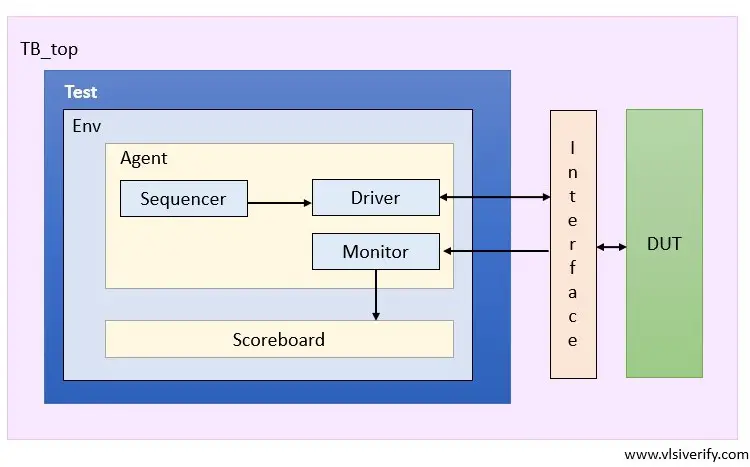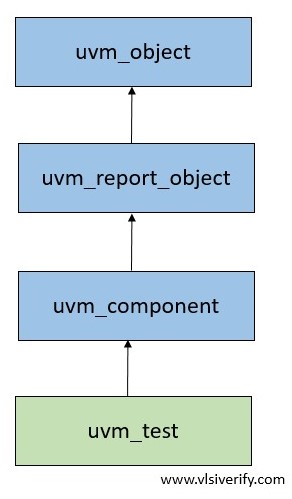Tutorials
Learn More
UVM Test
The test is at the top of the hierarchical component that initiates the environment component construction. It is also responsible for the testbench configuration and stimulus generation process. Based on the features and functionalities of the design mentioned in the verification plan, tests are written. The user-defined test class is derived from uvm_test.

uvm_test class hierarchy

Class Declaration
virtual class uvm_test extends uvm_componentThe test includes environment class, configurations, and start sequences over sequencers. It is recommended to have a base test that includes all testbench settings including an instance of the environment class, create configurations, etc and varieties of tests as per the verification test plan can be extended from the base test to avoid repeating the same code in every test. The derived tests can also set configurations based on test requirements.
Steps to write a test case
- Create a user-defined test class extended from uvm_test and register it in the factory.
- Declare environment, sequence handle, and configuration objects based on the requirement.
- Write standard new() function. Since the test is a uvm_component. The new() function has two arguments as string name and uvm_component parent.
- Implement build_phase to create instances of environment, sequence classes, and set configurable objects in the configurable database.
- Implement run_phase to start sequences on required sequencers with raise/drop objection callbacks.
UVM Test example
class my_test extends uvm_test;
env env_o;
base_seq bseq;
`uvm_component_utils(my_test)
// constructor
function new(string name = "my_test", uvm_component parent = null);
super.new(name, parent);
endfunction
function void build_phase(uvm_phase phase);
super.build_phase(phase);
env_o = env::type_id::create("env_o", this);
endfunction
task run_phase(uvm_phase phase);
phase.raise_objection(this);
bseq = base_seq::type_id::create("bseq");
repeat(10) begin
#5; bseq.start(env_o.agt.seqr);
end
phase.drop_objection(this);
`uvm_info(get_type_name, "End of testcase", UVM_LOW);
endtask
endclassExecution of the test
The test execution is a time-consuming activity that runs sequence or sequences for DUT functionality. On executing the test, it builds a complete UVM testbench structure in the build_phase and time consuming activities are performed in the run_phase with the help of sequences. It is mandatory to register tests in the UVM factory otherwise, the simulation will terminate with UVM_FATAL (test not found).
run_test() task
The run_test task is a global task declared in the uvm_root class and responsible for running a test case.
Declaration:
virtual task run_test (string test_name = "")1. The run_test task starts the phasing mechanism that executes phases in a pre-defined order.
2. It is called in the initial block of the testbench top and accepts test_name as a string.
Example:
// initial block of tb_top
initial begin
run_test("my_test");
end3. Passing an argument to the run_test task causes recompilation while executing different tests. To avoid it, UVM provides an alternative way using the +UVM_TESTNAME command-line argument. In this case, the run_test task does not require passing any argument in the initial block of the testbench top.
// initial block of tb_top
initial begin
run_test();
end
// Passing command line argument to the simulator
<other options> +UVM_TESTNAME = my_test4. After execution of all phases, run_test finally calls $finish task for simulator exit.
UVM Tutorials